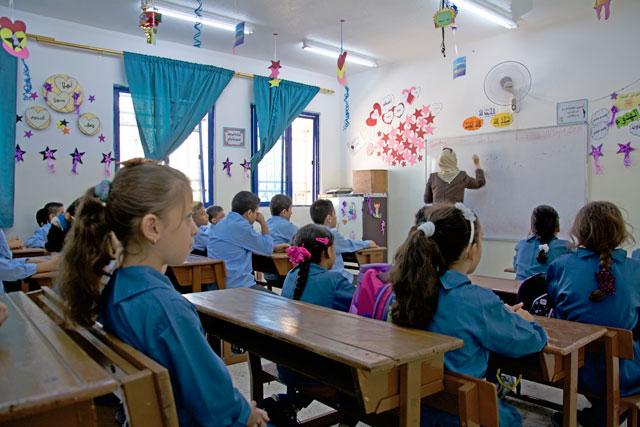You are here
Private-school teachers’ rights ‘grossly violated’ — syndicate, Social Security Corporation
By Laila Azzeh - Aug 22,2015 - Last updated at Aug 22,2015

Teachers supervise the morning assembly at a school in Amman recently. There are more than 40,000 private-school teachers in Jordan, according to the Social Security Corporation (Petra file photo)
AMMAN — Educators at private schools face “flagrant” violations of their rights, but the fear of unemployment drives them to continue working despite the injustices, according to informed sources.
Getting paid less than the minimum wage — sometimes less than half of the base pay — is not the only infringement a large number of private-school teachers face, according to the Jordan Teachers Association (JTA) and the Social Security Corporation (SSC).
“Many private schools are being creative in resorting to ways to deny teachers their rights. The sector was closed like a box in the past, but now with the establishment of the teachers’ syndicate, they are speaking out to find solutions,” Abeer Akhras, head of the JTA private education committee, told The Jordan Times on Saturday.
She noted that the association’s hotline has received thousands of complaints from teachers in the past few years, especially from female teachers, who make up around 89 per cent of the sector’s employees.
The fear of not finding another job in light of the difficult economic situation the country is going through and having other teachers willing to fill the job despite the injustices force educators choose to stay in their jobs, Akhras said, noting that there are also many private schools that are giving teachers all their rights.
“Being denied maternity and breastfeeding leaves and getting laid off after pregnancy are very common complaints among female teachers at private schools,” she said, highlighting a very “dangerous” phenomenon practised in the sector — forcing teachers into resignation at the end of each scholastic year and then rehiring them after the end of the summer vacation.
“This is very dangerous. Private schools resort to this in order to pay salaries for nine months instead of 12, but this process also results in teachers losing their social security rights for not having continuous years of service,” Akhras noted.
SSC Spokesperson Musa Sbeihi said thousands of teachers face this, estimating that around 11,000 private schools educators signed their resignation papers last summer and were later rehired.
“Many of the violations are also related to the salaries, such as teachers getting less money than what they have signed to receive. Teachers remain in their jobs because they fear that it is their only option,” noted Sbeihi, who said that there are more than 40,000 private-school teachers in Jordan.
“The sector has grown massively, but the regulations have remained the same. The rights of a very large segment of teachers are being violated,” he warned.
Sbeihi and Akhras noted that a by-law to regulate private education was formulated in cooperation with all stakeholders, but “has been on the shelf for half a year now”.
“There is huge lobbying from private-school owners against the system, which would address 90 per cent of the violations if applied,” the SSC spokesperson said.
Akhras agreed, voicing her astonishment over the “dominance of capital over education in a country like Jordan, in which the rule of law prevails”.
She stressed that the by-law is guaranteed to reduce violations, organise schools and classify them, and stipulated the maximum amount of school tuition and link it to teachers’ salaries.
“It is not acceptable for schools to be very expensive and give teachers very low salaries,” Akhras said.
“What is happening is a black dot in the history of Jordan. School owners should not rule the education process just because they have the money,” she noted.
The JTA official cited “Stand With Teachers” campaign, which was adopted by the National Committee for Equal Pay and headed by the Labour Ministry and the Jordanian National Commission for Women with the support of the International Labour Organisation, to raise teachers’ awareness of their rights.
Praising the unified contract which started to be applied in private schools last year to ensure the rights of teachers, Sbeihi noted, however, that it is not binding because it was not put under a legal umbrella by the Labour Ministry.
On the other hand, Private-School Owners Association President Munther Sourani has told The Jordan Times on many occasions that the syndicate supports all efforts to streamline the sector, acknowledging that many private schools violate the rights of teachers.
“No school should be established without taking the rights of teachers into consideration,” he said in previous remarks, adding that the “situation requires massive restructuring, but schools should at least pay teachers the minimum wage according to the law”.
The Jordan Times could not reach officials at the Education Ministry’s private education department for comment despite many attempts to contact them.
Related Articles
AMMAN – Violation of teachers’ rights at private schools continues to be “flagrant”, but thanks to a community-led campaign, educators are “
AMMAN — After enduring years of “flagrant” violations, private school educators will now enjoy better job security thanks to a new decision
AMMAN — The Social Security Corporation (SSC) subscriptions of more than 8,000 teachers in the private sector have been halted since the beg


















